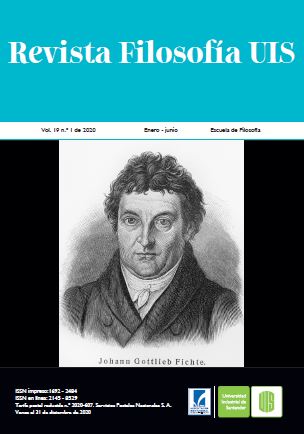The imagination: the beginning, middle and end of Hobbes’s state of nature
Published 2020-01-01
Keywords
- imagination,
- Aristotle,
- Hobbes,
- semiotics,
- aesthetics
How to Cite
Copyright (c) 2020 Revista Filosofía UIS

This work is licensed under a Creative Commons Attribution 4.0 International License.
Abstract
In this article, imagination is the key concept to identify natural man’s epistemological evolution. The primacy of the feeling of pleasure is going to expose, in three moments, the development of man’s mental faculties. First, natural man’s pictorial imagination refers pleasure to objects of sensibility and uses calculating reason to guarantee their stability. Second, an evolution towards a pictorial imagination mediated by a human power capable of bringing men together and imposing itself, in order to refer pleasure to a reality created by common signs and behaviors. Finally, the immediacy of the feeling of pleasure of the pictorial imagination is subordinate to the pleasure derived from the creation of significant linguistic symbols and sticking to them.
Downloads
References
Branda, C. (2008). Razón natural y racionalidad política en el Leviatán de Thomas Hobbes. Res publica: Revista de filosofía política, 20, 67-94.
Engell, J. (1981). The creative imagination: Enlightenment to romanticism. Cambrigde: Harvard University Press.
Duncan, S. (2013). Thomas Hobbes. En E. Zalta (ed.), The Stanford Encyclopedia of Philosophy. Stanford: Metaphysics Research Lab, Stanford University. Recuperado de http://plato.stanford.edu/archives/sum2013/entries/hobbes/
Hobbes, T. (2005). Leviatán. Ciudad de México: Fondo de Cultura Económica.
Jiménez, D. (2012). La prioridad del placer sobre el deseo en la teoría de las pasiones de Thomas Hobbes: una explicación, materialista, mecanicista y fisiológica. Cauriensia, (VII), 271-280.
Ferrater Mora, J. (1990). Diccionario de filosofía. Buenos Aires: Editorial Sudamericana.
Piccinini, M. (2005). Poder común y representación en Thomas Hobbes. En G. Duso (ed.), El Poder: Para una historia de la filosofía política moderna (pp. 98-112). Ciudad de México: Siglo XXI Editores.
Rosello, D. (2014). Hobbes y el hombre lobo: devenir animal en (y ante) la soberanía. En M. Figueroa (ed.), Poder y ciudadanía: estudios sobre Hobbes, Foucault, Habermas y Arendt (pp. 11-36). Santiago de Chile: Universidad Adolfo Ibáñez.
Rutheford, R. (2015). Hobbes in moral virtue and the laws of nature. En P. Easton y K. Smith (eds.), The Battle of the Gods and Giants Redux: Central Themes in Early Modern Philosophy. Boston: Brill. doi: https://doi.org/10.1163/9789004305922_012
Shields, C. (2014). Aristotle. En E. Zalta (ed.), The Stanford Encyclopedia of Philosophy. Stanford: Metaphysics Research Lab, Stanford University. Recuperado de http://plato.stanford.edu/archives/spr2014/entries/aristotle/
Slomp, G. (1990). The significance of glory in the political theory of Thomas Hobbes. (PhD thesis). London School of Economics and Political Science, London, England.
Zarka, Y. (2006). Hobbes y el pensamiento político moderno. Barcelona: Herder.

